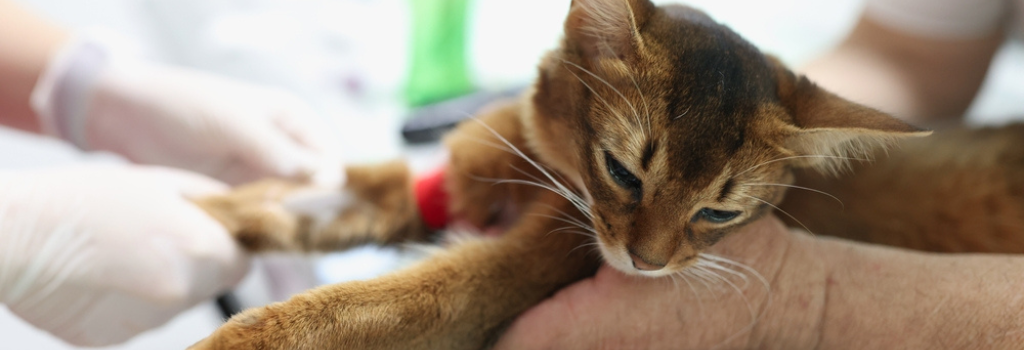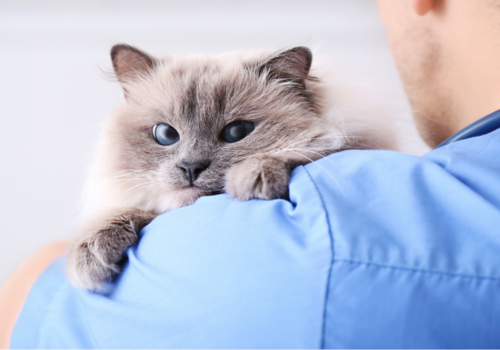Cats are amazing pets that have been companions to humans for centuries. Like all living things, however, cats can experience health emergencies that require immediate attention. Experiencing an emergency related to your cat can be a stressful situation to find yourself in. Luckily, planning ahead, knowing what to do when an emergency happens, and being prepared with the right supplies can make everything a little easier for both of you.
At Duxbury Animal Hospital, we get asked a wide variety of questions relating to emergency cat care. If you are located near Duxbury, MA and believe your cat may be having an emergency, please call us at (781) 737-7820 right away. Otherwise, here are the answers to some commonly asked questions about emergency care for cats.
What Should I Do if My Cat Has an Emergency?
If you think your cat is experiencing an emergency, call a veterinarian or emergency hospital immediately. If the veterinarian recommends bringing your cat in, bring them in as soon as possible. Your vet may also have other suggestions for you in the meantime to keep your pet more comfortable. Even though this is a highly concerning event, try to remain calm. You don’t want to frighten your cat or cause them any more elevated stress. Your vet may have certain recommendations depending on what kind of emergency your cat is having.

Common cat emergencies include:
- Breathing difficulties
- Urinary tract blockages
- Traumatic injury
- Heart Conditions
- Infected wounds
- Suspected poisoning
- Gastrointestinal distress
While this is not an exhaustive list of emergencies your cat may have that require immediate attention, these are the most common reasons cats need emergency care. If you suspect that your cat needs to be seen immediately, it never hurts to consult a professional.
What Are Some Common Signs and Symptoms of Emergencies in Cats?
Symptoms of health issues in cats differ from those in humans, so it’s important to know what signs and symptoms to look for. If you’re not sure if your cat has an emergency, here are some warning signs to watch out for:
- Vomiting or diarrhea
- Coughing or wheezing with difficulty breathing
- Loss of appetite
- Severe lethargy or weakness
- Fever
- Inability to pass urine or stool
- Bleeding
Should I Call a Veterinarian or Emergency Hospital Before Arrival?
Yes. You should always call your veterinarian or animal hospital before you arrive to let them know that your cat is coming in as an emergency patient. Make sure to ask if there are any specific items you should bring with you (such as medical records). This gives them time to prepare for your pet's arrival, so they can provide him or her with the best possible care right away.
How Will a Veterinarian Care for My Cat In an Emergency?
In an emergency situation, your veterinarian will gather all necessary information from you first and foremost. They’ll want to know all of the information that you have regarding the situation with your cat, like what happened, how long it has been since you noticed symptoms, or whether or not any treatments have been administered by you or another veterinarian.
Following this, your vet will thoroughly examine your cat and check their vitals. They’ll check for dehydration, blood loss, and any injuries visible to the eye. If necessary, they may administer medications to minimize pain or other symptoms. Your cat may need to have blood work or an x-ray performed to see the whole picture of your cat’s current health.
Once your veterinarian has gathered all the information necessary to diagnose your pet, they’ll be able to recommend treatments and the next steps for getting your cat on the road to recovery.
Should I Give My Cat First Aid At Home?
It is possible to perform first aid on your cat at home, depending on their symptoms. However, keep in mind that cats can be unpredictable when they're sick or in pain, so don't attempt first aid if doing so puts you at risk of injury. Your pet will likely behave differently than normal when injured or ill. They may become aggressive or defensive if they feel threatened by your actions, even if they’ve never acted aggressively before.
You may want to have things on hand in case of an injury, like gauze, nonstick bandages, and adhesive tape for bandages. Avoid using human bandages on pets, as these can be painful to remove. Having a digital thermometer and an eye dropper on hand is extremely useful when checking for fever and administering medication, respectively.
Always remember that first aid is not a substitute for veterinary care. First aid can be utilized to potentially save a pet’s life until veterinary care is available, but it’s always best to seek out professional guidance prior to taking any action that may interfere with the health of your cat.
How Do You Do CPR On a Cat?
Ideally, CPR for your cat would be performed by a veterinarian. However, it can be a life-saving treatment if your cat’s breathing or heart stops. To best prepare yourself for this scenario, it may be helpful to take a pet CPR class to ensure you’re correctly helping your cat. If you find yourself in an emergency situation and need to give your cat CPR right away, you can follow these guidelines.
CPR for cats is similar to CPR for humans. The first step is to check for your cat’s heartbeat and breathing. You can do this by placing your hand on the left side of their chest. You should be able to tell whether or not your pet is breathing by the rise and fall of their chest. If you don’t notice one or both of these signs of life, you may start chest compressions. For adult cats, you’ll use the heel of your dominant hand over their heart. For kittens, you’ll want to use your thumb.
Do 30 chest compressions in a row, making sure to press the chest down to at least half of its regular width. Follow this with a rescue breath by fully extending your cat’s neck to open their airway. Place your mouth over your cat’s nose and exhale until you see their chest rise. Repeat these steps until you either detect breathing and a heartbeat or arrive at a veterinary hospital.

Why Is Prompt Treatment During an Emergency Vital to My Cat's Health?
The sooner you get your cat to a veterinarian, the better. Cat emergency care can be life-saving for your pet, but it's important to know that cats are often reluctant to seek help from humans if they feel unwell or experience pain. This can cause an issue because waiting too long for treatment could result in permanent disability or death for your cat. Keep a close eye on your cat, even if it seems like their symptoms are minor. Don’t hesitate to contact us if your cat is displaying strange behavior; it might save their life.
Is There Anything Else I Should Know About Cat Emergency Care?
If you have a cat, it's crucial that you know what to do in an emergency. It’s important to be prepared to do what is necessary to minimize harm to your beloved pet. If your cat is experiencing any of the symptoms listed above or appears severely ill or injured in any way, call us at (781) 737-7820.